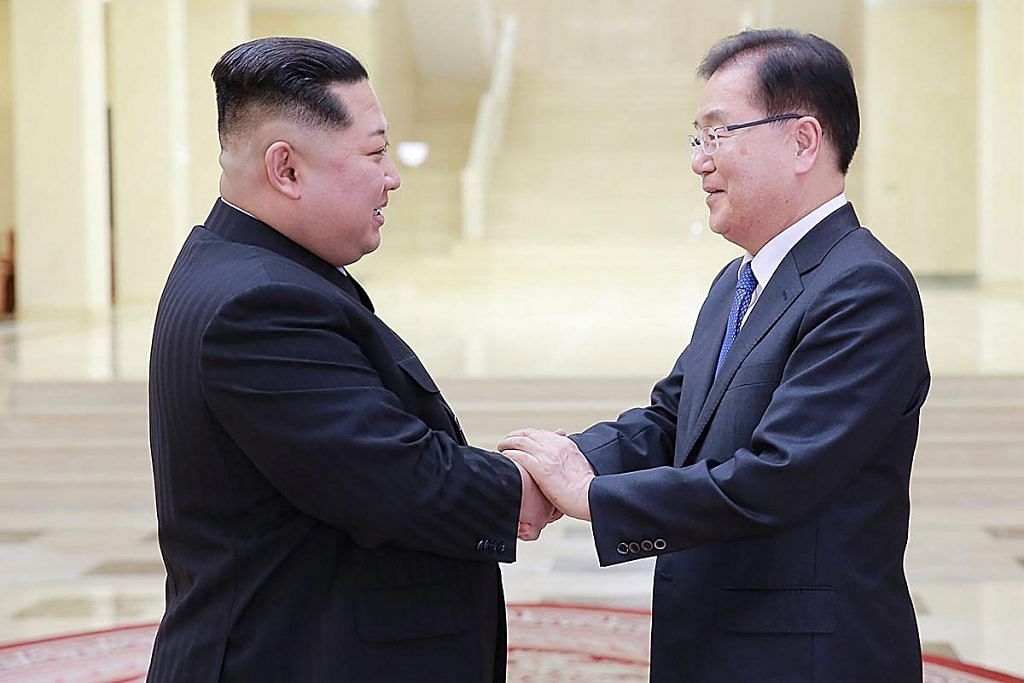The situation in North Korea seems almost too good to be true, given how difficult peace processes have been in the past. Turkey’s Erdogan had called for early elections last week, which has run into issues as he is facing strong opposition now. Meanwhile, Macron, the “Trump whisperer”, has yet to make his charm offensive work.
The path to peace in Pyongyang
“For North Korea to end its war on the South, and accept the South as a legitimate, coequal government on the peninsula, would mean abandoning the quest that has legitimized the Kim family’s rule for three generations. The decision would call into question why, exactly, North Korea should hold power at all. It would be system-threatening,” writes Nicholas Eberstadt in the New York Times, explaining why he thinks North Korea’s latest attempt at peace is “phony”.
“And so the North, rather than committing to a legally binding (and potentially destabilizing) peace treaty, is likely to do again what it has gotten away with in previous meetings with the South: dangle aspirational goals in jointly signed, but totally unenforceable, official statements.”
Eberstadt writes strongly against underestimating the “political psychopathology of appeasement”. According to him, people grow weary of constant conflict and are therefore likely to believe in solutions even if there are none. The path to true peace, therefore, is unlikely to be paved with good intentions.
“South Korean officials say that any permanent peace deal will be conditioned on the North’s denuclearization and that the North has agreed to that term. Only, the two governments do not agree on what “denuclearization” means,” Eberstadt points out.
“The South, and its allies, have in mind a complete, irreversible and verifiable process under which the North would forgo all of its nuclear weapons. The North tends to talk instead of the “denuclearization of the Korean Peninsula,” which starts with cutting the South’s ties with its nuclear ally, the United States. And when it comes to denuclearization at home, Pyongyang frames the matter as an arms-control question: If America reduces its arsenal, so will we.”
“North Korea is a fearsome adversary. Let’s not play pretend-diplomacy with it,” he writes.
Erdogan’s political predicament
Last week, Turkish President Recep Tayyip Erdogan called for early elections, moving it from November 2019 to June 24. He hopes to transition his government from a parliamentary system to a presidential system, granting himself more power.
“But Erdogan’s opponents have quickly rallied, showing fresh energy and unanticipated strategic thinking. Erdogan now faces the very real possibility of being democratically unseated. “Bring it on,” a spokesman for the center-left Republican People’s Party (CHP) publicly announced about the early elections,” writes Borzou Daragahi in Foreign Policy.
“Erdogan’s opponents have responded by forming an unlikely alliance against him centered on two potential candidates: Meral Aksener, the charismatic leader of the newly formed Iyi Party, and former President Abdullah Gul. It remains unclear which presidential candidate the combined opposition will rally around.”
“Turkey’s shifting political landscape may have also prompted the early election call. Iyi is an offshoot of the Nationalist Movement Party (MHP), which is the AKP’s partner. The new party’s emergence and apparent momentum threaten to draw in MHP supporters disillusioned with party leader Devlet Bahceli’s chummy relationship with Erdogan. Quick elections could stem the bleeding.”
The “Trump whisperer”
Emmanuel Macron is in the United States, and is tasked with the job of changing Donald Trump’s opinion on a variety of issues, from the Iran nuclear deal to climate change.
“For the first time, the American president hinted that he might be interested in a European idea, promoted by the French president, of brokering an add-on deal to cover wider American concerns about Iran. If this can keep Mr Trump on board, it would be a big diplomatic coup for Mr Macron,” writes The Economist.
“The French president’s proposal is one that France, Britain and Germany have been working on closely together. The idea would be to widen the existing agreement, made in 2015 with the Europeans, Russia, America and China, with a side deal. This would cover Iran’s ballistic missile programme and its regional interference, as well as extend beyond 2025 Iran’s commitment to curb its nuclear activities. Though Mr Trump, standing next to Mr Macron in Washington, this week called the existing deal “insane” and “ridiculous”, he also hinted that there was some common ground between them. “I think,” said Mr Trump, “we will have a great shot at doing a much bigger, maybe, deal.””
“The pair make a decidedly odd couple. It is hard to imagine two Western leaders with more contrasting world views. The host, a brash former reality-television star was elected on a promise to shut borders and spurn multilateralism. The guest, a cerebral philosophy graduate, won power by rejecting nationalism and praising Europe and the liberal world order. Yet the pair seem to have found a certain respect for each other,” the Economist writes.
“By staking so much on the Iran deal, Mr Macron has put his credibility as an emerging European leader on the line.”
“At some point, however, there will be domestic pressure on Mr Macron to show something in return for all this Trump-flattery. He has on occasion exaggerated his influence over his American counterpart. But he also knows that their differences are great and, at times, insurmountable. “Sometimes I manage to convince him, and sometimes I fail,” Mr Macron said earlier this year. The best the French president may be able to hope for is to tame Mr Trump’s wilder instincts and keep him at least listening to those inside the Western liberal-democratic club. For now, Mr Macron looks like the smartest European handler of the tricky American president. In the longer run, if he cannot secure tangible returns for his efforts, he will run the risk of looking naive, or foolish, or both.”
